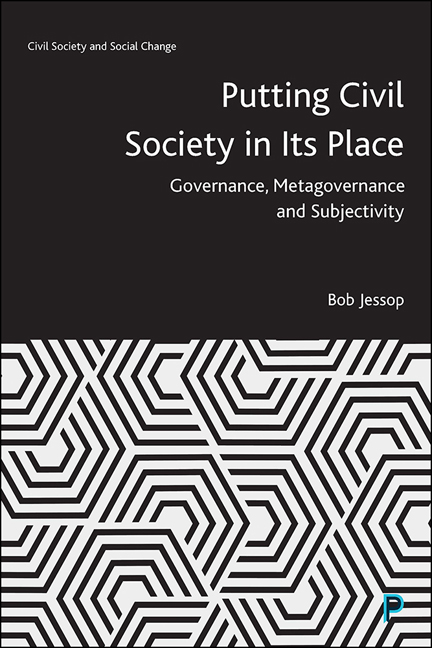Book contents
- Frontmatter
- Dedication
- Contents
- List of Tables and Figures
- Abbreviations
- Note on the Author
- Acknowledgements
- Licensing Information
- Preface
- 1 Introduction
- Part I Complexity, Contingency and Governance
- Part II Locating Civil Society as a Mode of Governance
- Part III Governance Failure and Metagovernance
- Endnotes
- References
- Index
5 - Locating the WISERD Project: Public policy governance towards common good
Published online by Cambridge University Press: 18 March 2021
- Frontmatter
- Dedication
- Contents
- List of Tables and Figures
- Abbreviations
- Note on the Author
- Acknowledgements
- Licensing Information
- Preface
- 1 Introduction
- Part I Complexity, Contingency and Governance
- Part II Locating Civil Society as a Mode of Governance
- Part III Governance Failure and Metagovernance
- Endnotes
- References
- Index
Summary
Governance is said to be one of the public–private spheres of activities that are essential for the flourishing of a stronger civil society. It is seen to comprise new forms of relationship that can transform an arena of ‘unstructured complexity’ that covers the corporate and public spheres (Osborne, 2010: 6) into more structured complexity. This is the form of meta-heterarchy discussed in Part I of this book, which is concerned to reorder networks, reorganize the conditions of self-organization and promote new forms of dialogue. This reorganization can allow the formation of public governance that is more concerned with the creation and governing of public policy and initiatives. Its first-order roles are to address societal problems and enhance policy opportunities (Osborne, 2010: 80) for the building of possible common goods and to enlarge civil society.
Origins of WISERD
The Wales Institute for Social & Economic Research Data & Methods arose from a series of long-standing and distinctive research collaborations within Wales. Its origin was an earlier bid for a Wales Institute of Economic and Social Research (WISER), which aimed to build capacity around usage of Welsh data and to conduct research into geography and locality, regeneration and Welsh governance. Following advice from the Higher Education Funding Council for Wales and the Economic and Social Research Council (ESRC), the proposal was revised to include colleagues with significant quantitative experience and to consider ways in which joint funding could be awarded through integration of the WISER bid with a continuation of the methodological and research capacity-building work of the existing Cardiff-based unit, QUALITi, funded from 2005–08 by the ESRC as a Node of the National Centre for Research Methods (NCRM). QUALITi was a research unit at Cardiff University that focused on innovation, improvement and impact in qualitative research methods, especially concerning the social contexts in which research methods and methodologies are situated. By bringing QUALITi and WISER together, WISERD was created as a collaborative venture between the research-intensive universities of Aberystwyth, Bangor, Cardiff, South Wales and Swansea.
Its aims can be described as:
To build and develop existing expertise in quantitative and qualitative research methods and methodologies
- Type
- Chapter
- Information
- Putting Civil Society in Its PlaceGovernance, Metagovernance and Subjectivity, pp. 103 - 124Publisher: Bristol University PressPrint publication year: 2020



